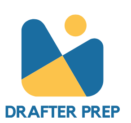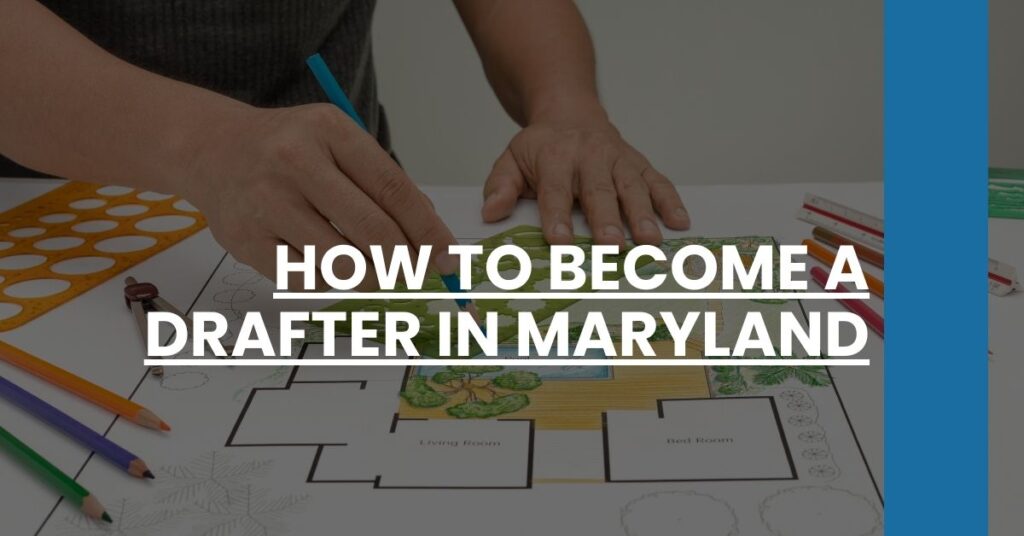Looking for schools in a specific city? Check out our lists of Drafter in Baltimore, Columbia, and Germantown.
Learning how to become a drafter in Maryland opens the door to a rewarding career.
- Education pathways: Explore community colleges offering drafting programs.
- Certification options: Understand key certifications like AutoCAD.
- Job search strategies: Leverage local job boards and networks.
Follow our guide to take your first steps in the drafting world in Maryland.
- How to Become a Drafter in Maryland
- Certification and Training Opportunities
- Job Search Strategies and Career Development
- Maryland-Specific Opportunities and Resources
- Salary and Job Outlook for Drafters in Maryland
- Tips for Success in Your Drafting Career
- Looking for Drafter Information On States Bordering Maryland?
- Conclusion
How to Become a Drafter in Maryland
Understanding the Role of a Drafter
Drafters play an integral role in various industries by creating detailed technical drawings and plans. These professionals translate specifications from engineers, architects, and designers into clear, comprehensive blueprints. Their work supports projects in construction, manufacturing, and engineering.
Specializations in Drafting
Drafters may specialize in different fields:
- Architectural Drafters: Focus on building plans and architectural designs.
- Civil Drafters: Create plans for infrastructure projects like bridges and highways.
- Mechanical Drafters: Design mechanical devices and machinery.
- Electrical Drafters: Plan electrical systems and components.
Key Responsibilities
You will undertake several essential tasks as a drafter:
- Creating Technical Drawings: Use CAD software to produce detailed plans.
- Collaborating with Teams: Work with engineers, architects, and other professionals.
- Ensuring Compliance: Ensure all drawings meet industry standards and regulations.
Educational Requirements for Becoming a Drafter
High School Preparation
Aspiring drafters should focus on specific subjects during high school, such as:
- Mathematics: Develop your skills in geometry and algebra.
- Computer Graphics: Gain familiarity with graphic design software.
- Design Technology: Learn the basics of technical drawing and design principles.
Post-Secondary Education
Maryland offers several educational pathways to becoming a drafter. Community colleges and universities provide relevant programs that equip students with the necessary skills.
- Associate Degrees: Community colleges like the Community College of Baltimore County and Anne Arundel Community College offer associate degrees in drafting technology. These programs cover CAD software, technical drawing, and materials science.
- Bachelor’s Degrees: Some drafters pursue bachelor’s degrees for advanced roles and specializations. Universities offer programs with deeper dives into specific drafting fields, such as civil or mechanical drafting.
Certification and Licensing Requirements
Importance of Certification
While Maryland does not mandate specific licenses for drafters, certifications can enhance your qualifications. These credentials validate your expertise and increase your job prospects.
- CAD Certifications: Proficiency in CAD software is crucial. Obtain certifications in platforms like AutoCAD and SolidWorks.
- ADDA Certification: The American Design Drafting Association offers a Certified Drafter (CD) credential. This certification demonstrates your technical skills and commitment to the profession.
Continuing Education
To stay current with industry standards, you must engage in continuous education. Advanced courses and recertification ensure your skills remain relevant and competitive.
Skill Set Needed for a Drafter
Technical Skills
Proficiency in technical drawing and CAD software is fundamental for drafters. Essential technical skills include:
- CAD Software: Mastering programs like AutoCAD, SolidWorks, and Revit.
- Technical Drawing: Developing precise and accurate technical plans.
- 3D Modeling: Using software to create three-dimensional representations of designs.
Analytical Skills
Strong analytical skills are vital for solving design problems and ensuring accuracy in your drawings.
- Attention to Detail: Precision is crucial in technical drawings.
- Spatial Awareness: Visualize how components fit together in a design.
- Problem-Solving: Address and resolve design challenges.
Communication Skills
Effective communication is key to collaborating with architects, engineers, and other team members.
- Verbal Communication: Clearly convey ideas and feedback.
- Written Communication: Document specifications and details accurately.
- Team Collaboration: Work effectively with diverse professional teams.
By developing these skills, you can excel as a drafter and contribute significantly to your projects.
For comprehensive services tailored to your specific needs, visit Our Services.
Certification and Training Opportunities
Obtaining Relevant Certifications
Getting certified can significantly enhance your credentials as a drafter in Maryland. Both CAD software certifications and industry-specific certifications are valuable.
- CAD Software Certifications: Becoming certified in software like AutoCAD or SolidWorks demonstrates your proficiency and makes you more appealing to employers. These programs often offer various levels, from fundamental to advanced, allowing you to showcase your depth of knowledge.
- Industry Certifications: Consider obtaining the Certified Drafter (CD) credential from the American Design Drafting Association (ADDA). This certification validates your technical expertise and commitment to best practices in the drafting profession.
Continuing Education and Professional Development
Continuous learning is essential in the ever-evolving field of drafting. Engaging in professional development keeps you current with the latest industry standards and technological advancements.
- Workshops and Seminars: Participate in industry conferences and workshops to stay updated on emerging trends and network with other professionals.
- Advanced Courses: Enroll in advanced courses focusing on 3D modeling, simulation, and specialized drafting software.
- Professional Organizations: Join organizations such as the Maryland Society of Professional Engineers to access continuous learning resources and networking opportunities.
Training Programs in Maryland
Several institutions in Maryland offer specialized training programs tailored for drafters. These programs equip you with practical skills and industry knowledge.
- Community Colleges: Schools such as the Community College of Baltimore County provide comprehensive drafting technology programs that cover CAD, design principles, and hands-on projects.
- Technical Schools: Local technical schools offer specialized courses in mechanical, civil, and architectural drafting.
- Online Courses: Consider reputable online platforms offering certificates in drafting and CAD software. These courses provide flexibility, allowing you to balance your studies with work and other commitments.
Job Search Strategies and Career Development
Networking and Professional Organizations
Networking plays a critical role in your job search and career development. Engaging with professional organizations can open doors to opportunities and provide industry insights.
- Maryland Society of Professional Engineers: Join this organization to connect with industry professionals, attend events, and access job listings.
- Industry Conferences: Attend conferences to meet potential employers and learn about the latest trends in drafting and design.
- Mentorship Programs: Seek out mentorship opportunities to gain guidance and advice from experienced drafters.
Utilizing Job Boards and Local Resources
Leveraging job boards and local resources can streamline your job search process.
- Job Boards: Utilize platforms like Indeed, Glassdoor, and LinkedIn to find drafting positions. Set up job alerts to stay informed about new postings.
- Maryland Workforce Exchange: This state-specific resource offers job search tools, resume assistance, and career counseling services.
- Recruitment Agencies: Partner with recruitment agencies specializing in technical and engineering roles. They can match you with relevant job opportunities based on your skills and experience.
Building a Strong Portfolio
A strong portfolio is essential for showcasing your skills and projects to potential employers.
- Diverse Projects: Include a range of projects that demonstrate your versatility and proficiency in different drafting specializations.
- Detailed Descriptions: Provide detailed descriptions of each project, outlining your role, the software used, and any challenges you overcame.
- High-Quality Visuals: Use clear, high-resolution images and, if possible, 3D renderings to showcase your work effectively.
Long-Term Career Development
Committing to long-term career development ensures sustained growth and success in the drafting field.
- Advanced Certifications: Pursue advanced certifications to deepen your expertise and open up higher-level opportunities.
- Specializations: Consider specializing in high-demand areas, such as electrical or architectural drafting.
- Lifelong Learning: Continuously seek educational opportunities, such as workshops, advanced courses, and certifications, to stay at the forefront of the industry.
Maryland-Specific Opportunities and Resources
Job Market and Industry Demand
Maryland offers a robust job market for drafters, driven by several key industries.
- Construction: The state’s growing construction industry creates a steady demand for architectural and civil drafters.
- Technology: Maryland’s thriving tech sector offers opportunities for mechanical and electrical drafters.
- Government Projects: Proximity to Washington, D.C., means a significant presence of government projects, including defense contracts, requiring a range of drafting specializations.
Local Employment Resources
Local resources can provide valuable support in your job search.
- Maryland Job Network: This platform offers job listings, career resources, and industry-specific information tailored to the Maryland job market.
- Baltimore CAD Users Group: Participate in events and workshops organized by this group to stay updated with the latest CAD technologies and network with peers.
Professional Development Resources
Take advantage of Maryland-specific professional development opportunities to advance your career.
- Local Workshops and Seminars: Attend events hosted by local organizations and institutions to gain new skills and knowledge.
- Networking Events: Participate in local networking events to connect with industry professionals and potential employers.
- Job Fairs: Attend job fairs specifically geared towards the drafting and engineering sectors to meet recruiters and explore job opportunities.
Salary and Job Outlook for Drafters in Maryland
Average Salary
Drafters in Maryland enjoy competitive salaries, often above the national average.
- Entry-Level Salaries: Starting salaries typically range from $45,000 to $55,000 annually, depending on the specialization and level of education.
- Experienced Drafters: With experience, drafters can expect to earn between $55,000 and $75,000 per year. Specializations in certain high-demand fields may yield higher salaries.
Factors Influencing Salaries
Several factors can influence your salary as a drafter in Maryland.
- Specialization: Specialized roles, such as electrical drafter or architectural drafter, often command higher salaries.
- Experience: More experienced drafters with advanced certifications and extensive portfolios typically earn higher wages.
- Geographic Location: Proximity to metropolitan areas like Baltimore and Washington, D.C., can lead to higher salaries due to increased demand for skilled professionals.
Job Outlook
The job outlook for drafters in Maryland remains positive, with steady demand expected in various industries.
- Industry Growth: Growing construction and technology sectors contribute to a robust job market for drafters.
- Technological Advancements: As technology continues to evolve, drafters proficient in the latest software and tools will be in high demand.
- Government Projects: Ongoing government projects, especially in defense and infrastructure, create additional opportunities for drafters.
Tips for Success in Your Drafting Career
Building a Strong Portfolio
Creating a standout portfolio is essential for demonstrating your skills and attracting potential employers.
- Showcase Diversity: Include a variety of projects to highlight your versatility.
- Detail-Oriented Descriptions: Provide clear, detailed descriptions of each project and your specific contributions.
- Visual Quality: Use high-quality images and 3D renderings to effectively present your work.
Staying Current with Technology
Keeping up with technological advancements is crucial for success in the drafting field.
- Regular Software Updates: Stay updated with the latest versions of CAD software and other relevant tools.
- Advanced Training: Enroll in advanced training courses to learn about new technologies and techniques.
- Industry News: Follow industry news and trends to stay informed about emerging tools and practices.
Networking and Professional Involvement
Active involvement in professional organizations and networking can open doors to opportunities and foster career growth.
- Join Organizations: Become a member of professional organizations like the Maryland Society of Professional Engineers.
- Attend Events: Participate in industry events, conferences, and workshops to network with peers and stay updated on trends.
- Seek Mentorship: Find mentors who can provide guidance, advice, and support as you navigate your career.
Looking for Drafter Information On States Bordering Maryland?
In addition to Maryland, we suggest looking for schools in nearby states.
- How to Become A Drafter in Virginia
- How to Become A Drafter in West Virginia
- How to Become A Drafter in Pennsylvania
- How to Become A Drafter in Delaware
- How to Become A Drafter in New Jersey
Conclusion
By following these steps, you can establish a successful career as a drafter in Maryland. Leveraging local resources, obtaining relevant certifications, and continuously developing your skills will help you stay competitive in this dynamic field. For more information on services to help you advance your career, visit Our Services.

